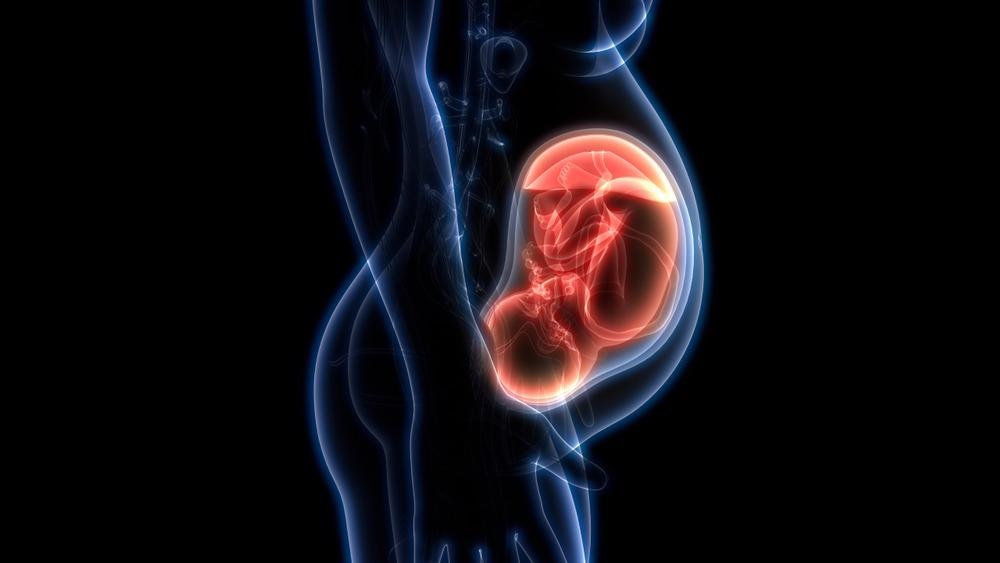The development of the fetus in utero is a fraught time, as environmental insults can drastically change the course of events in multiple organ systems. For one thing, maternal infection is associated with a higher risk of neuropsychiatric disease in the future. The cause is thought to be related to the activation of the maternal immune system, rather than the effects of the pathogen itself.

Fetus. Magic mine/Shutterstock.com
Background
Normal human pregnancy is a time of challenge to the human immune system, since the fetus, which has a partly different antigenic composition from the mother, must be safeguarded against immunologic attack by the maternal immune system. This phenomenon is called immune tolerance.
Simultaneously, the mother must be able to protect herself and her fetus against pathogenic attacks. Disruption of maternal immunologic tolerance has been found to result in various diseases specific to pregnancy that can lead to serious illness and even death for either the mother or the fetus, or both.
MIA and abnormal neurodevelopment
Maternal immune activation (MIA) is a term that refers to an increase in the levels of inflammatory markers such that they consistently remain in the high normal range. This is seen under conditions of psychological and social stress, psychological disorders of the mother and excessive body mass, for instance. These conditions have been linked to a higher incidence of impaired neurodevelopment and mental illness in the offspring over time.
Rodent studies have shown similar trends, while associating the abnormal outcomes with the activated state of maternal immunity rather than the cause of inflammation. “It is considered that rather than damage being induced by the infectious agent itself, maternal infection disrupts the delicate immune balance between the maternal and fetal environments. Hereby, the milieu for the developing fetal nervous system is altered paving the way for the occurrence of aberrant brain structures and functions, which form the basis for an augmented risk for offspring mental disorders.”
Many studies have shown a link between specific inflammatory markers during pregnancy and alterations. For instance, the neurological network that determines cognitive function is affected by high levels of cytokines like interleukin 6 (IL-6). Immune activation in the mother has been causally traced to disorders such as autism spectrum disorder (ASD) or schizophrenia.
Several researchers think that inflammatory markers like IL-6, IL-1α, IL-10, tumor necrosis factor α (TNFα), and C-reactive protein (CRP), or complement system components, may play a role in the fetal outcome. In animal studies, IL-6 injections during pregnancy led to chronic behavioral sequelae in the offspring, while IL-6 inhibition prevented the adverse outcomes.
Mechanisms of neuropsychiatric sequelae
The mechanism of neuropsychiatric perturbation may be via multiple pathways, from disruption of normal neuronal development to epigenetic changes that make the brain of the offspring more vulnerable to a later trigger. For instance, research on teenage pregnancies has shown that the higher maternal IL-6 levels were associated with increased functional connectivity in the brain of the babies, affecting brain areas known to be crucial for normal consciousness, self-awareness, and multi-sensory integration.
Salience network and inflammation
The same type of association was found in older mothers too, affecting connectivity within functional areas of the brain concerned with salience detection, sensory integration and learning/memory function.
The salience network is crucial in identifying and filtering stimuli that are relevant to behavior, from a flood of incoming stimuli. In order to accomplish this, the salience network uses past experience, present metabolic status and future goals, for example. A breakdown in this network is linked to schizophrenia and ASD, adding importance to the observation of altered connectivity in this area with higher maternal immune activation during pregnancy.
Other indicators of altered behavioral development include higher impulsivity and impaired working memory. The postnatal environment would also contribute to the final outcome, of course, but the effect of inflammation and immune activation on prenatal neurodevelopment is hard to ignore.
The effect of a modest rise in IL-6 levels on functional neuronal connectivity is striking, indicating that the uterine environment plays a crucial role at specific time points, in the future cognitive development of the offspring. Small changes in maternal hormones could also change the way genes are expressed in the offspring, as well.

Pregnancy. Image Credit: Syda Productions/Shutterstock.com
Epigenetic changes
Even subclinical infection in the mother could affect the risk of future psychiatric disorders in the offspring, perhaps by causing placental inflammation and inflaming the fetal brain, though this is not yet clear. MIA could lead to extensive epigenetic changes by decreasing methylation of DNA within the hypothalamus.
The resulting disruption of the hypothalamo-pituitary-adrenal axis, if proved, could partly explain the later risk of schizophrenia, as gray matter alterations in this brain region have been linked to both this disorder and to ASD. Histone modifications by MIA also cause anhedonic behavior and may change the level of expression of serotonin transporter, leading to depression later on.
At an early stage of pregnancy, MIA also seems to affect the motility and behavior of microglia in brain tissue. Such abnormalities can contribute to the abnormal cognitive development seen in the offspring. In rodents, synapse formation seems to be a casualty, with the genes regulating this process being deregulated by MIA, thus reducing gene expression, synaptic contact and neuronal formation. Inflammation of the brain cortex and changes in synaptic structure and function have also been described, along with oxidative stress in the cortical tissue.
The resulting decrease in synapse structure and plasticity could impact the risk of behavioral abnormality, especially ASD and schizophrenia.
Intrapartum fever is another potential risk factor for fetal outcomes like encephalopathies or cerebral palsy, again possibly linked to the increased levels of inflammatory cytokines in both mother and fetus. Long-term cognitive deficits are more likely with a history of maternal fever at the time of childbirth.
MIA and Microbiome
MIA in pregnancy causes a rise in inflammatory cytokines that impact the vagal network of the fetus, thus causing dysregulation of the brain’s development. It also affects the microbiota of the maternal gut, and thus of the offspring’s gut over the long term. The fetal gut microbiome is influenced by the prenatal environment, the mode of delivery, maternal diet and postnatal care.
Probiotics, or beneficial bacterial species in the gut, may help correct dysbiosis and have been investigated in children with ASD who have lower diversity in the gut microbiome, accompanied by an overgrowth of certain bacteria like Desulfovibrio and Alistipes. Animal studies show a beneficial effect of oral probiotics and fecal microbial transplant therapy.
In future research, the respective roles played by multiple inflammatory markers, at various points in pregnancy, and the type of delivery, the postnatal setting, and sex differences, will have to be explored to elucidate the interactions of these factors with the neurodevelopmental outcome in the offspring.
References
- Boulanger-Bertolus, J. et al. (2018). Increasing Role of Maternal Immune Activation in Neurodevelopmental Disorders. Frontiers in Behavioral Neuroscience. https://doi.org/10.3389/fnbeh.2018.00230. https://www.frontiersin.org/articles/10.3389/fnbeh.2018.00230/full
- Conway, F. et al. (2019). Maternal Immune Activation and Related Factors in the Risk of Offspring Psychiatric Disorders. Frontiers in Psychiatry. https://dx.doi.org/10.3389%2Ffpsyt.2019.00430. https://www.ncbi.nlm.nih.gov/pmc/articles/PMC6611212/
- Kreitz, S. et al. (2020). Maternal immune activation during pregnancy impacts on brain structure and function in the adult offspring. Brain, Behavior, and Immunity. https://doi.org/10.1016/j.bbi.2019.09.011. https://www.sciencedirect.com/science/article/pii/S0889159119301783?via%3Dihub
- Ozaki, K. et al. (2020). Maternal Immune Activation Induces Sustained Changes in Fetal Microglia Motility. Scientific Reports. https://doi.org/10.1038/s41598-020-78294-2. https://www.nature.com/articles/s41598-020-78294-2
- Lins, B. R. et al. (2019). Maternal Immune Activation during Pregnancy Alters the Behavior Profile of Female Offspring of Sprague Dawley Rats. eNeuro. https://dx.doi.org/10.1523%2FENEURO.0437-18.2019. https://www.ncbi.nlm.nih.gov/pmc/articles/PMC6477592/
- Lins, B. R. et al. (2018). Prospective Analysis of the Effects of Maternal Immune Activation on Rat Cytokines during Pregnancy and Behavior of the Male Offspring Relevant to Schizophrenia. eNeuro. https://dx.doi.org/10.1523%2FENEURO.0249-18.2018. https://www.ncbi.nlm.nih.gov/pmc/articles/PMC6140112/
- Coiro, P. et al. (2019). Sex and Gender Bias in The Experimental Neurosciences: The Case of The Maternal Immune Activation Model. Translational Psychiatry. https://doi.org/10.1038/s41398-019-0423-8. https://www.nature.com/articles/s41398-019-0423-8
- Cieslik, M. et al. (2020). Maternal Immune Activation Induces Neuroinflammation and Cortical Synaptic Deficits in the Adolescent Rat Offspring. International Journal of Molecular Science. https://doi.org/10.3390/ijms21114097. https://www.mdpi.com/1422-0067/21/11/4097/htm
Further Reading
Last Updated: Feb 14, 2022